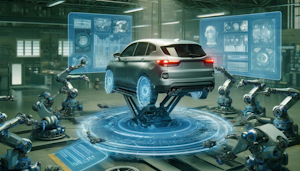 UseCasesFor.ai
UseCasesFor.ai
Choose Topic
 UseCasesFor.ai
UseCasesFor.ai
AI Use Cases
A collection of over 250 uses for artificial intelligence
A continually updated list exploring how different types of AI are used across various industries and AI disciplines,including generative AI use cases, banking AI use cases, AI use cases in healthcare, AI use cases in government, AI use cases in insurance, and more

Sign up
to receive a PDF containing all the use cases and stay updated with the latest AI trends and news (you can always unsubscribe)
Car inspections

Introduction
In the automotive industry, the inspection of cars is an important step that helps in determining the safety and functionality of any car. Conventionally, this process has been done manually by experts but with the help of computer vision AI this is changing. CV AI is a kind of artificial intelligence that aims at making computers capable to make sense of the visuals around them. In the context of car inspections, CV AI can help perform the task, which would otherwise require a human being to do, thus making the process faster, more effective and precise. This technology is currently being embraced by various firms across the globe, and is therefore changing the face of car inspection practices.
Challenges
There are, however, some challenges that come with the use of CV AI in car inspections. First, there is the question of data. To train CV AI, one needs a lot of data and acquiring such can be a costly and time-consuming process. Second, there is the problem of accuracy. In theory, CV AI can detect defects better than a human inspector but in practice, it has a hard time with difficult or questionable cases. Third, there is the issue of integration. The implementation of CV AI into current inspection systems poses some technical problems and may also need changes in the process. Finally, there is the problem of perception. When it comes to AI, most people in the automotive sector are doubtful and even if they are persuaded to try it, convincing them to rely on it is not easy.
AI Solutions
Despite these challenges, there are still many companies that are working on creating solutions that incorporate CV AI for car inspections. For instance, Neural Propulsion Systems (NPS) is applying CV AI to generate highly detailed 3D representations of cars which enable measurement and flaw identification. Yet another company UVeye is employing CV AI to perform automatic vehicle inspections where a vehicle is scanned and defects are detected within seconds. These solutions are mainly built on the principles of deep learning which is a ability to learn from images and make reliable guesses. It is also commonly integrated with other technologies including LIDAR and infrared imaging to enhance the overall precision and reliability.
Benefits
There are a lot of advantages of using CV AI for car inspections as well. First, it can greatly enhance the efficiency of inspections and therefore more cars can be inspected within a given time. It can also enhance the efficiency of inspections as AI algorithms have a way of identifying defects that would otherwise be hard for humans to notice. Furthermore, CV AI can help to ensure that the inspection process is more consistent and less influenced by human variables, thereby lowering the chances of an error being made. Last but not the least, using CV AI in inspection can liberate the human inspectors to attend to more important duties, which in the long run may yield financial benefits and improved efficiency.
Return on Investment
The return on investment (ROI) for CV AI in car inspections can be significant. According to a study by McKinsey, automating quality inspection with AI can reduce inspection costs by up to 50% and increase detection rates by up to 90%. Moreover, by reducing the risk of defects and recalls, CV AI can potentially save companies millions of dollars in warranty costs. However, the exact ROI will depend on various factors, including the cost of implementing the AI solution, the volume of cars being inspected, and the current performance of manual inspections.